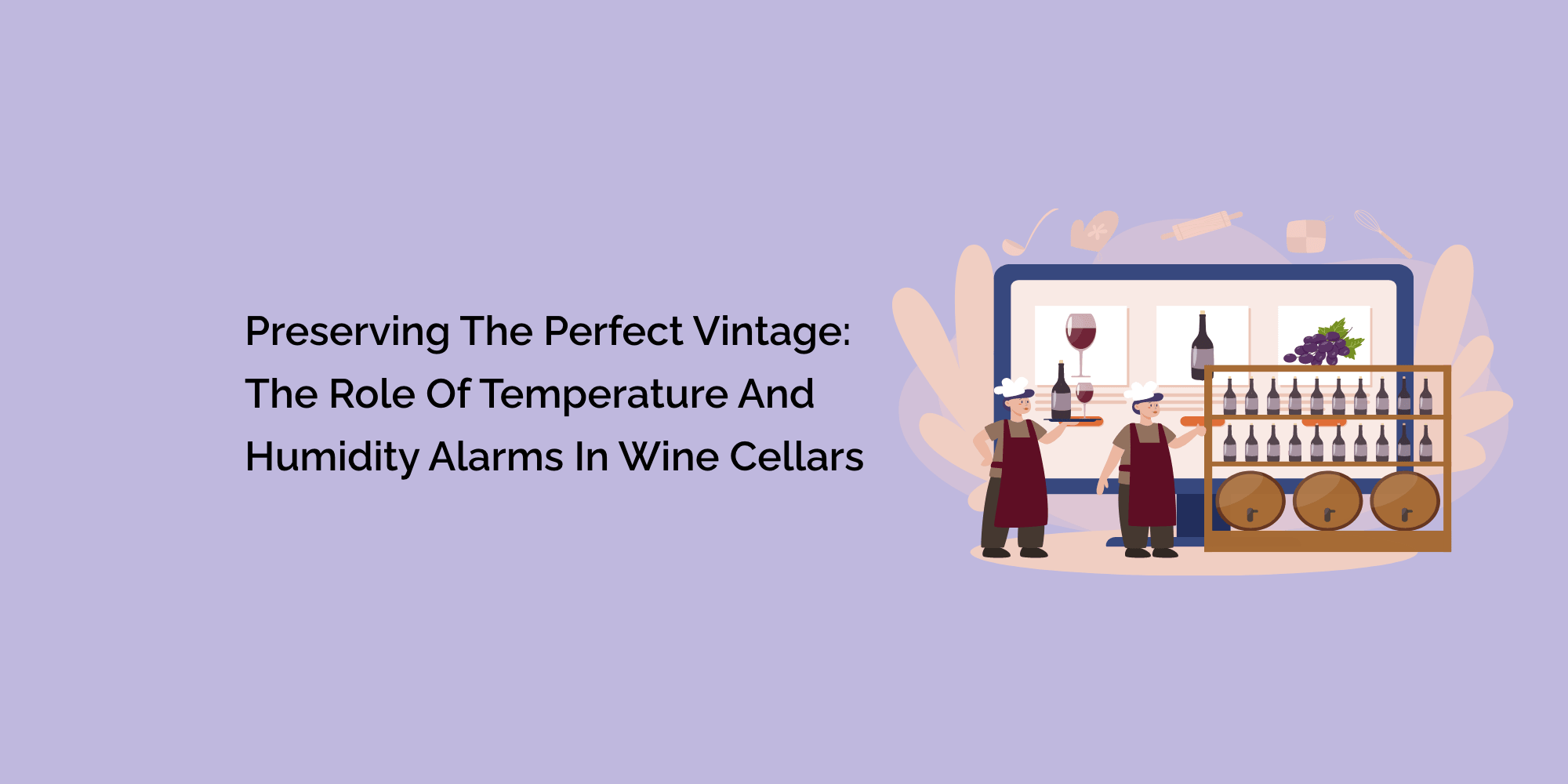Wine enthusiasts understand the significance of proper storage conditions in preserving the quality and flavor of their prized vintages. Temperature and humidity play a crucial role in the aging process and the overall preservation of wines. Wine cellars in homes or professional establishments require careful monitoring and control of these environmental factors to ensure optimal aging and prevent damage. This blog will explore the importance of temperature and humidity alarms in wine cellars. We will discuss their role in maintaining the ideal storage conditions, preventing wine spoilage, and preserving the integrity of valuable collections. By understanding the impact of temperature and humidity on wine quality, enthusiasts can appreciate the essential role that alarms play in creating the perfect aging environment.
The Influence of Temperature on Wine Preservation
We will explore the relationship between temperature and wine preservation. Fluctuations in temperature can lead to chemical reactions that accelerate wine aging or cause spoilage. We will discuss the ideal temperature range for wine cellars, the effects of temperature deviations on wine quality, and how temperature alarms help maintain the desired storage conditions.
The Significance of Humidity in Wine Cellars
Humidity levels are crucial in wine cellars as they impact cork integrity, prevent mold growth, and maintain the wine's freshness. We will explain the importance of humidity control, the recommended humidity range for wine storage, and the risks associated with low or high humidity. Additionally, we will discuss how humidity alarms contribute to maintaining the optimal environment.
Preventing Wine Spoilage and Oxidation
Temperature and humidity alarms are vital in preventing wine spoilage and oxidation. Fluctuations in these factors can lead to off-flavors, premature aging, and deterioration of the wine's characteristics. We will explore the consequences of inadequate monitoring and the benefits of alarms in alerting cellar owners to potential risks, allowing them to take corrective measures promptly.
Maintaining Consistency and Aging Potential
Consistency is vital in wine cellars, especially for those aging wines over extended periods. Temperature and humidity alarms help maintain stable conditions, allowing wines to age consistently and develop their desired flavor profiles. We will discuss the importance of precise control and monitoring in preserving the aging potential of wines.
Protection Against External Factors
Temperature and humidity alarms safeguard wines from internal fluctuations and protect against external factors. We will explore how notices warn early about environmental changes caused by power outages, HVAC system failures, or other unforeseen events. By detecting these changes, cellar owners can take immediate action to protect their valuable wine collections.
Integration with Cellar Management Systems
Temperature and humidity alarms can be integrated with cellar management systems, enhancing control and monitoring capabilities. We will discuss the benefits of integration, such as centralized data collection, real-time analysis, and automated alerts. This integration allows cellar owners to efficiently manage and track temperature and humidity levels, simplifying operations.
Compliance with Wine Storage Standards
Wine storage standards, such as those set by professional organizations and regulatory bodies, emphasize the importance of maintaining specific temperature and humidity conditions. We will discuss critical guidelines, such as those established by the International Organization of Vine and Wine (OIV) and regional wine associations, and how temperature and humidity alarms assist in compliance efforts.
Selecting the Right Temperature and Humidity Alarm System
We will guide you in selecting the appropriate temperature and humidity alarm system for wine cellars. Factors such as accuracy, reliability, ease of use, remote monitoring capabilities, and integration options should be considered. We will explore different types of alarms, including standalone sensors and intelligent systems, to help cellar owners make informed decisions.
Calibration and Maintenance of Alarm Systems
Regular calibration and maintenance of temperature and humidity alarm systems are necessary to ensure accurate readings and reliable performance. We will discuss best practices for calibration, recommended maintenance intervals, and the importance of professional assistance for complex alarm systems.
Certainly! Here are some frequently asked questions (FAQs) about temperature and humidity alarms in wine cellars:
Why do I need temperature and humidity alarms in my wine cellar?
Temperature and humidity alarms are essential in wine cellars to maintain optimal storage conditions for preserving wine quality. Fluctuations in these factors can lead to spoilage, accelerated aging, or deterioration of flavors and aromas. Alarms provide early warnings, allowing cellar owners to take corrective actions and ensure the longevity of their wine collections.
What are the risks of inadequate temperature and humidity monitoring in wine cellars?
Inadequate monitoring can expose wines to various risks. Temperature fluctuations can result in premature aging, off-flavors, and compromised quality. Incorrect humidity levels may lead to mold growth, cork drying, or excessive moisture, affecting wine freshness and overall integrity.
What is the ideal temperature range for wine cellars?
The ideal temperature range for wine cellars generally falls between 12 to 18 degrees Celsius (54 to 64 degrees Fahrenheit). This range balances aging and preservation, allowing wines to develop complexity while avoiding rapid deterioration.
Conclusion
Temperature and humidity alarms are invaluable in preserving the perfect vintage in wine cellars. By providing continuous monitoring, timely alerts, and the ability to maintain optimal storage conditions, alarms help prevent wine spoilage, maintain aging potential, and protect valuable collections. With the right alarm system, wine enthusiasts and professionals can ensure that each bottle ages gracefully, offering exceptional flavors and aromas. Investing in temperature and humidity alarms is a testament to the dedication and commitment to preserving the integrity of wines, ultimately enhancing the wine-tasting experience and bringing joy to connoisseurs worldwide.








